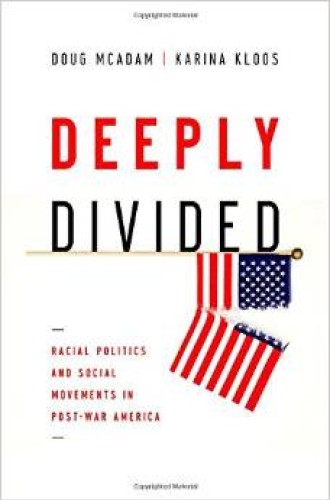Deeply Divided, by Doug McAdam and Karina Kloos
Politics have always been dirty. For every triumph of cooperation and principle, there are dozens of instances of division, mudslinging, and vitriol. All students of history understand this fact.
It seems, though, that in recent years American politics have taken a particularly dark and nasty turn. Jason Chaffetz, a freshman Republican member of Congress from Utah, publicly vowed that he and a group of colleagues would “take the government down” if congressional leaders did not acquiesce to their demands, and months later he won reelection with 76 percent of the vote. A bipartisan bill to establish a task force to develop a plan to address the nation’s deficit failed to pass the U.S. Senate because eight original Republican cosponsors of the legislation voted against their own bill upon learning that President Obama was in support of the measure. Midway through his second term in office, Obama faces a nation in which 25 percent of the population believe that his presidency is illegitimate because, they maintain, he was not born in America, 17 percent hold that he is a practicing Muslim, and according to one poll—this is not a joke—10 percent believe he is the Antichrist. Is this really politics, even dirty politics, as usual?
Doug McAdam, a professor of sociology at Stanford University, and Karina Kloos, an activist and scholar of social movements, think not. In Deeply Divided, the authors argue that contemporary American politics have taken an extreme turn that has ground previously functioning political processes to a halt, all but eliminated bipartisanship and compromise, and helped to create the greatest inequality in wealth that the United States has seen since the 1920s. They write, “The events of the past six years—serial budget crises, government shutdown, willful sabotage of presidential appointments, etc.—have told us all we need to know about escalating paralysis and government dysfunction.” The ten Congresses between 1948 and 1968 averaged almost 1,400 pieces of legislation enacted in each two-year period. By comparison, the most recent Congress enacted a grand total of 284 pieces of legislation in the same amount of time. Can we be surprised that one in three Americans now identify “government/Congress/politicians” as the nation’s most pressing problem?





